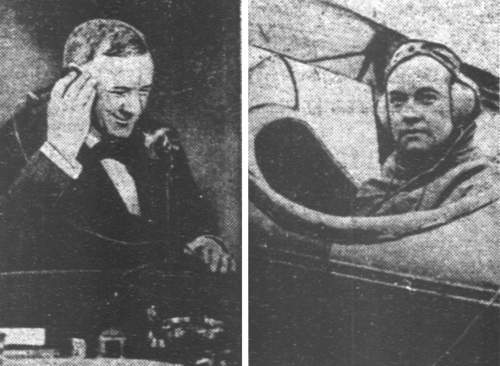Today in Science History - Quickie Quiz
Wireless Telephone Record Established
Message Sent to Distant Airplane
Naval Experts Announce Longest Transmission of Signals From Flying Machine
from Ellensburg Daily Record (11 Mar 1919)
Washington, March 11.—Secretary Daniels today talked by radio telephone with Ensign Harry Sgenwater [sic] in a navy flying boat enroute from Washington to Hampton Roods. Communication was established at a distance of more than 150 miles by far the longest transmission of radio telegraph signals to an airplane In flight ever achieved.
The secretary used the ordinary desk telephone on his desk. Officers in charge of development of radio signalllng were grouped around the desk. Mr. Daniels spoke of his pleasure of his making a test of the constantly improving navy apparatus and asked the Ensign how far away his machine was. After a moments delay he replied that he was then more than 150 miles from Washington and flying at a high altitude.
From newspaper
Ellensburg Daily Record (11 Mar 1919), 1.
(source).
Navy Chief and Flyer to Whom He Talked via Air
from The Washington Times (16 Mar 1919)

Secretary Daniels and Ensign Faganwater
A new epoch in aerial wireless telephone communication was established recently when Secretary Daniels, from his desk in the Navy Department at Washington maintained conversation with Ensign Faganwater, piloting a seaplane, until the latter was 150 miles distant. The photographs show Secretary Daniels at his desk, and Ensign Faganwater in his seaplane with his receiving apparatus strapped around his head.
From
The Washington Times (16 Mar 1919), 9.
(source)
Nature bears long with those who wrong her. She is patient under abuse. But when abuse has gone too far, when the time of reckoning finally comes, she is equally slow to be appeased and to turn away her wrath. (1882) --
Nathaniel Egleston, who was writing then about deforestation, but speaks equally well about the danger of climate change today.
 Carl Sagan
Carl Sagan: In science it often happens that scientists say, 'You know that's a really good argument; my position is mistaken,' and then they would actually change their minds and you never hear that old view from them again. They really do it. It doesn't happen as often as it should, because scientists are human and change is sometimes painful. But it happens every day. I cannot recall the last time something like that happened in politics or religion. (1987) ...
(more by Sagan) Albert Einstein: I used to wonder how it comes about that the electron is negative. Negative-positive—these are perfectly symmetric in physics. There is no reason whatever to prefer one to the other. Then why is the electron negative? I thought about this for a long time and at last all I could think was “It won the fight!” ...
(more by Einstein) Richard Feynman: It is the facts that matter, not the proofs. Physics can progress without the proofs, but we can't go on without the facts ... if the facts are right, then the proofs are a matter of playing around with the algebra correctly. ...
(more by Feynman)





